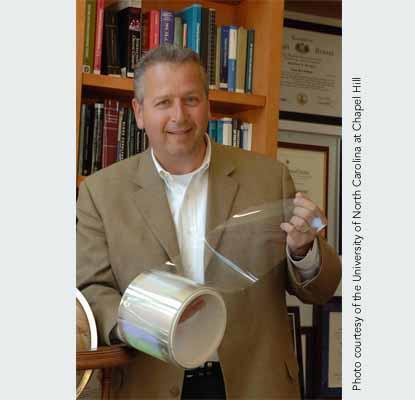Joseph M. DeSimone
Diversity is a key tenet of invention and innovation for Joseph M. DeSimone, who has succeeded in applying his inventive expertise to a range of fields including green manufacturing, medical devices and nanomedicine, with a unique ability to transfer his novel solutions from the lab to the marketplace. For these achievements, DeSimone has been named the 2008 winner of the $500,000 Lemelson-MIT Prize.
DeSimone was born in Norristown, Pa. His mother is an accountant, and his father is a tailor who emigrated from Italy. They are both inquisitive and meticulous —DeSimone acquired these attributes from them. In 1986, he received his B.S. in chemistry from Ursinus College in Collegeville, Pa, a small liberal-arts college that was the only school on the east coast to offer a polymer chemistry course. “I’m a firm believer in a liberal arts education, and especially using that education as a bridge to go into the applied sciences and engineering area,” said DeSimone.
His exposure to polymer science led him to pursue a PhD in chemistry from Virginia Polytechnic Institute and State University in Blacksburg, Va. At the age of 25, DeSimone joined the University of North Carolina at Chapel Hill (UNC) as an assistant professor in chemistry and launched the university’s polymer program with his mentor Dr. Edward Samulski. He resides there today as the Chancellor’s Eminent Professor of Chemistry at UNC, in addition to serving as the William R. Kenan, Jr. Distinguished Professor of Chemical Engineering at North Carolina State University.
Among DeSimone’s notable inventions is an environmentally friendly manufacturing process that relies on supercritical carbon dioxide instead of water and bio-persistent surfactants (detergents) for the creation of fluoropolymers or high-performance plastics, such as Teflon®. More recently, he worked on a team to design a polymer-based, fully bioabsorbable, drug-eluting stent, which helps keep a blocked blood vessel open after a balloon-angioplasty and is absorbed by the body within 18 months.
DeSimone’s newest invention is PRINT® (Particle Replication in Non-wetting Templates) technology, used to manufacture nanocarriers in medicine. At present, DeSimone’s Lab is vested in a variety of projects that also extend beyond medicine, including potential applications for more efficient solar cells and morphable robots. In 2004, DeSimone co-founded Liquidia Technologies with a team of researchers from UNC to make the technology available in the market. Liquidia is using the PRINT technology to develop precisely engineered nanocarriers for highly targeted delivery of biological and small molecule therapeutics to treat cancer and other diseases. DeSimone’s proposed applications for cancer treatment with the PRINT platform was instrumental in UNC landing a grant of $24 million from the National Cancer Institute to establish the Carolina Center for Cancer Nanotechnology Excellence.
“You can do all the innovating you want in the laboratory, but if you can’t get it out of the university walls you do no one any good,” said DeSimone. He instills an entrepreneurial spirit in his students that focuses on the importance of commercializing technology and scientific inventions. One of DeSimone’s greatest accomplishments is his mentorship of more than 45 postdoctoral research associates, 52 PhD candidates, six MS theses and 21 undergraduate researchers. Furthermore, he speaks to groups of high school students about the inventive process and encourages them to learn and explore areas that are less familiar to them to broaden their exposure to other disciplines.
A prolific inventor, DeSimone holds more than 115 issued patents with more than 70 new patent applications pending, and he has published more than 240 peer-reviewed scientific articles. In 2005, at the young age of 41, DeSimone was elected into both the National Academy of Engineering and the American Academy of Arts and Sciences, a high honor in the academic community. DeSimone has received numerous awards and recognition, including the Presidential Green Chemistry Challenge Award (1997), the Engineering Excellence Award by DuPont (2002), and the American Chemical Society Award for Creative Invention (2005).
DeSimone was honored in 2013 with the National Medal of Techonology and Innovation for his pioneering innovations in the field of chemisty.


